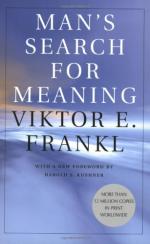
|
| Name: _________________________ | Period: ___________________ |
This test consists of 15 multiple choice questions and 5 short answer questions.
Multiple Choice Questions
1. What kind of sickness affected most of the prisoners in 1945?
(a) Typhus.
(b) Scarlet Fever.
(c) Herpes.
(d) Measles.
2. Why does the author decide not to try to escape the concentration camp?
(a) He decides that he would rather stay with his patients.
(b) He fears that the route out of the camp is too visible.
(c) He decides that his recent good mood would make the escape too obvious, and asks his friend to escape on his own.
(d) He believes that there is too much space outside the concentration camp, and they will not make it to the next populated town.
3. Who does the author claim entertained thoughts of suicide in the concentration camp?
(a) The author claims these thoughts were particularly common among men.
(b) The author notes that nearly all of the prisoners entertained these thoughts.
(c) He notes there was a high suicide rate among the Capos.
(d) The author writes that suicide was most common when it was snowing.
4. During the time that the author spent in concentration camps, what does he describe as his main work?
(a) Preparing bodies for burial.
(b) Working in the kitchen.
(c) Cleaning the guards' living and work quarters.
(d) Digging and laying tracks for railway lines.
5. What are "premium coupons"?
(a) These came from the construction firm that hired the workers from the prison, and could be exchanged for cigarettes.
(b) Raffle tickets given to the SS guards to award them things previously owned by the prisoners.
(c) These came from the construction firm that hired workers through the prison, and could be used to buy days off work.
(d) These were certificates from the SS guards, and were awarded to prisoners who arrived to work before the morning bell rang.
6. Were all foremen harsh and cruel?
(a) Yes, and the harshest tended to hold the most power.
(b) No, there were some who felt sorry for the prisoners.
(c) Very nearly all.
(d) Yes, this was always true.
7. What kind of complex does the author write prisoners suffered from?
(a) A Persecution complex.
(b) A Napoleon complex.
(c) An Inferiority complex.
(d) A Marytyr complex.
8. How did Frankl respond to an SS officer who called him a pig, and asked him what his profession was?
(a) He refused to speak.
(b) He said he had been a psychiatrist, and understood perfectly what his issues were.
(c) He argued that it was none of his business, and then tried to hit him.
(d) He told him he was a doctor who did charitable work.
9. What concentration camp does the author describe traveling to?
(a) Dachau.
(b) Buchenwald.
(c) Sachsenhausen.
(d) Auschwitz.
10. What were the wishes and desires of prisoners?
(a) Food and comfort.
(b) Intellectual stimulation.
(c) The strongest desire was often for more water than was readily available.
(d) Most of the men wished for intimacy.
11. Why does the author, after leaving camp, upon seeing an image of prisoners lying on their bunks, argue that these aren't horrible images?
(a) They are images of sick prisoners who could stay in bed all day.
(b) They are images of men from the Capo who had been demoted, and one of them had been in a position to be cruel to the author before this demotion.
(c) They are images of men that he knew, and all of them survived.
(d) They were images of people who had been spared the gas chambers.
12. What does the author attempt to describe in this essay?
(a) The experience of living in a concentration camp.
(b) The reason that the Nazis rose to power.
(c) The ways in which living in a concentration camp made prisoners stronger.
(d) The last days of the war.
13. Under what conditions does Frankl describe the SS beating prisoners?
(a) At the direction of the SS authorities, prisoners were beaten.
(b) When they spoke before being spoken to.
(c) When they were injurred and unable to work.
(d) At the slightest provocation or for no reason at all.
14. Who greets the prisoners upon their arrival at the concentration camp?
(a) Cruel SS guards with dogs.
(b) Cheerful prisoners speaking different languages.
(c) An unidentified man who directs the prisoners to form two separate lines.
(d) The director of the camp.
15. What does the author claim hurts most about the physical blows from SS officers?
(a) The unfairness of the blows.
(b) The use of sticks to hit the prisoners.
(c) The way that the officers hit prisoners where they were already injured.
(d) The way in which the SS officers did not speak to the prisoners before beating them.
Short Answer Questions
1. What does Frankl call "the ultimate and the highest goal to which man can aspire."
2. What did the prisoners think of indoor work?
3. What characterizes the second phase of a prisoner's mental state?
4. How many mental phases does the author claim that concentration camp prisoners go through?
5. How did prisoners experience beauty?
|
This section contains 899 words (approx. 3 pages at 300 words per page) |

|




